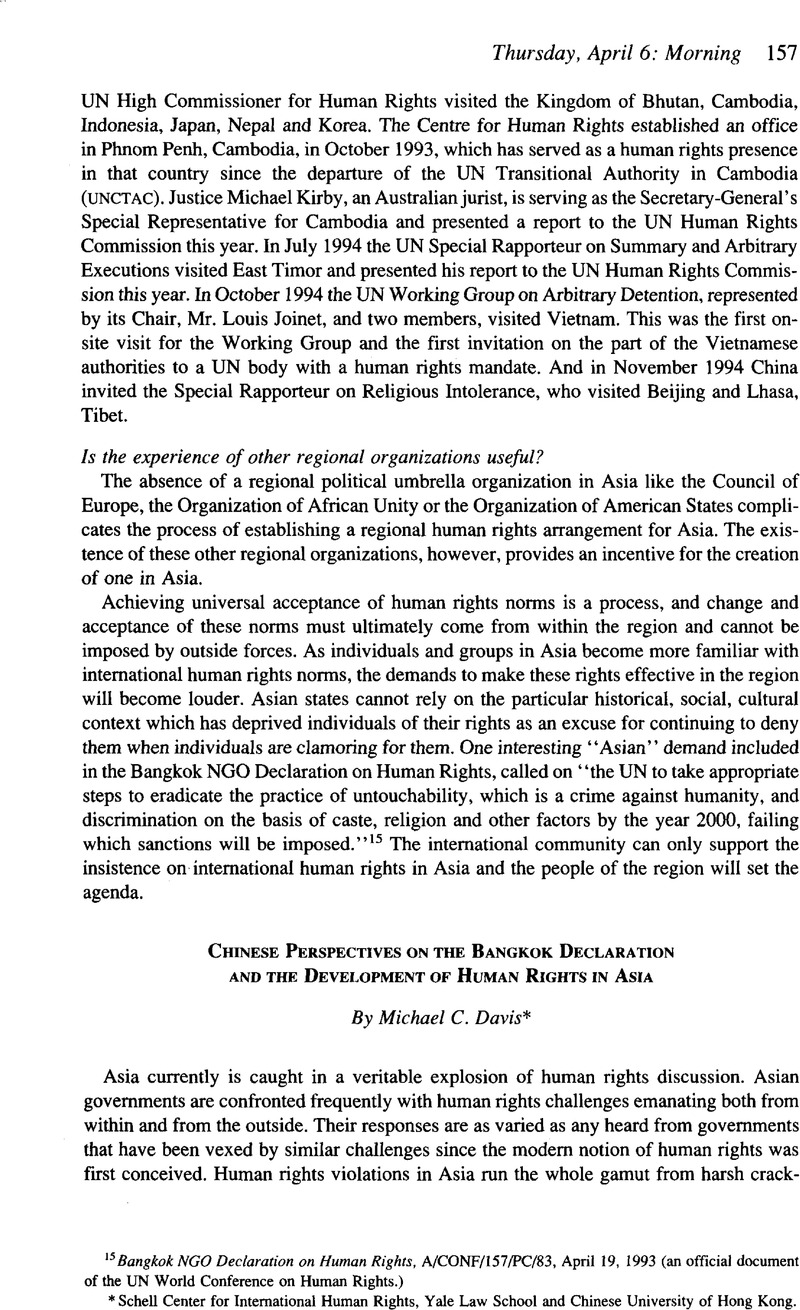Published online by Cambridge University Press: 28 February 2017

1 Johnson, Chalmers, Political Institutions and Economic Performance: The Government-business Relationship in Japan, South Korea and Taiwan , in Frederic C. Deyo, The Political Economy Of The New Asian Industrialism 136 (1987), Guillermo O’Donnell, Philippe C. Schmitter, Transitions From Authoritarian Rule (1986)Google Scholar.
2 The Bangkok Declaration, Declaration of the Ministers and Representatives of Asian States, Bangkok, 29 March-2 April 1993 (hereinafter Bangkok Declaration).
3 Our Voice, Bangkok NGO Declaration on Human Rights, Reports of the Asia Pacific NGO Conference on Human Rights and NGOs’ Statements to the Asia Regional Meeting (Bangkok: Asian Cultural Forum on Development, 1993). This Bangkok meeting included representation from more than 150 Asian NGOs, and representation from outside groups.
4 Hall, Peter A., Taylor, Rosemary C. R., Political Science and the Four New Institutionalisms , paper presented at the Annual Meeting of the American Political Science Association, New York, 1994 Google Scholar.
5 Bickel, Alexander M., The Least Dangerous Branch: The Supreme Court At The Bar Of Politics , (2d Ed. 1986)Google Scholar; Mcdougal, Myers & Michael Reisman, W., International Law Essays: A Supplement To International Law In Contemporary Perspective (1981)Google Scholar; Unger, Roberto M., Social Theory: Its Situation And Its Task, A Critical Introduction To Politics, A Work In Constructive Social Theory (1987)Google Scholar.
6 Du, Gangjian, Song, Gang, Relating Human Rights to Chinese Culture: The Four Paths of the Confucian Analects and the Four Principles of a New Theory of Benevolence , in Michael C. Davis, Human Rights And Chinese Values, Legal, Philosophical And Political Perspectives 35 (1995)Google Scholar.
7 China had earlier passed a Criminal Procedure Law (1979, revised 1984) and recently passed an Administrative Procedure Law. On the positive side it also recently enacted laws on prisoners and police, a new State Compensation Law and a law on the independence of lawyers (allowing for private law firms). At the same time, prosecutors’ powers are to be boosted under a draft Law and Penalties for Corruption and Bribery and the Procurator General’s Law. The new Detailed Regulation on the Implementation of State Security Law issued in July appears to give almost unfettered power to arrest those alleged guilty of “hostile activities.”
8 The official legal newspaper, Legal Daily, recently published an article entitled “A Call for Judicial Independence,” which surprisingly admits that China’s supposedly independent judiciary is far from free (of party interference). Call for Free Judiciary, South China Morning Post (SCMP), May 24, 1994, p. 8.
9 CCP vigilance over newspapers usually produces sackings of offending editors. Independent Minded Editor Sacked in Purge, SCMP, April 30, 1994, p. 7. This same scrutiny extends to film-makers and uncooperative ones may be banned from making movies or have their films banned. Blitz on the Film-makers, SCMP, April 16, 1994, p. 19.
10 Randle Edwards, R., Louis Henkin & Andrew Nathan, Human Rights In Contemporary China (1986)Google Scholar.
11 Human Rights in China (Beijing: Information Office of the State Council, 1991).
12 Jordan, Ann D., Women’s Rights in the People’s Republic of China: Patriarchal Wine Poured from Socialist Bottles , 8 J. Chinese L. , Issue 1 (1994)Google Scholar.
13 Beijing in Fear of a Peasants’ Revolt, SCMP, March 9, 1994, p. 1.
14 Zhu, Feng, Human Rights and the Political Development of Contemporary China, 1979-1994 , in Michael C. Davis, Human Rights And Chinese Values, Legal, Philosophical And Political Perspectives 116 (1995)Google Scholar.
15 Du and Song, supra, n. 6.
16 Alarm at Challenge to Leaders, SCMP, March 11, 1994, p. 1.
16 12 Intellectuals Petition China on Corruption, New York Times, February 26, 1995, at Al. There have also been recent reports that liberal scholars have set up on Hainan Island another reform-minded think tank called the China (Hainan) Reform and Development Institute.
18 Speech by Liu Huaqiu, Head of the Chinese Delegation at the World Conference on Human Rights (Vienna: Permanent Mission of the PRC to the United Nations in Vienna, 15 June 1993).
19 United Nations World Conference on Human Rights: Vienna Declaration and Programme of Action, Adopted 25 June 1993, 32 ILM 1661 (1993).
20 Alexis De Tocqueville, Democracy In America (1945).
21 Questions surrounding China’s current political transition will certainly have a bearing on this.